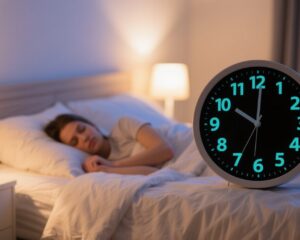Common Misunderstandings About Insomnia
1. Insomnia is a minor issue that can be solved with sleeping pills
While sleeping pills may help induce sleep, they often lead to shallow, short sleep and do not address the underlying causes of insomnia. This creates a cycle of dependency, as the body may develop tolerance to the medication, rendering it ineffective over time. Rather than calming the anxiety surrounding sleep, reliance on pills can escalate the problem.
2. Trying to sleep by lying in bed is effective
Many people believe that lying in bed and trying to fall asleep is beneficial. However, this often leads to frustration and restlessness, creating negative associations with the bed. If after 30 to 60 minutes you are still awake, it’s better to get up and engage in a relaxing activity until you feel sleepy again.
3. Seeking every opportunity to sleep
Daytime napping or going to bed early in hopes of catching up on sleep can backfire. This inconsistency disrupts the body’s natural sleep cycle, making it harder to fall asleep at night. Establishing a consistent sleep schedule helps regulate your internal clock and improves sleep quality over time.
4. Alcohol helps with sleep
Though alcohol may make you feel drowsy initially, it disrupts the sleep cycle, resulting in lighter, less restorative sleep and frequent awakenings throughout the night.
5. Severe insomnia is a perpetual condition
Many people fear that severe insomnia will never improve. In reality, insomnia can fluctuate. According to recent medical definitions, insomnia is not typically a nightly occurrence but appears at least three times a week. Understanding this can reduce the anxiety that feeds into the insomnia cycle.
6. Remedies like milk or melatonin can fully cure insomnia
While drinking warm milk or using supplements like melatonin may help some people relax before bedtime, they should not be seen as cures for insomnia. They can be helpful in promoting a calm atmosphere, but won’t fix the root causes of sleep issues.
Sleep Hygiene Education: Practical Recommendations for Better Sleep
1. Restrict time in bed to enhance sleep quality
Only spend time in bed when you intend to sleep. Prolonged time in bed without sleep can lead to fragmented sleep. Wake up at the same time every day, regardless of the previous night’s sleep quality.
2. Establish a consistent waking time
Wake up at the same time every day to help regulate your biological clock. This consistency helps promote a regular sleep schedule.
3. Regular exercise is beneficial
Exercise can alleviate difficulties falling asleep and promote deeper sleep. However, avoid vigorous workouts within three hours of bedtime, as they can hinder the transition to sleep. Opt for calming activities like walking or yoga in the evening.
4. Create a comfortable sleep environment
Ensure your bedroom is quiet, dark, and at a comfortable temperature. Consider investing in blackout curtains or earplugs if necessary.
5. Mind your eating habits
Avoid going to bed hungry as it can disrupt sleep, but also avoid heavy meals before bed. A light snack, like carbohydrates, might help.
6. Control bedroom temperature
Maintain a comfortable bedroom temperature—not too hot or too cold—to help facilitate sleep.
7. Limit fluid intake before bedtime
Reduce the risk of nighttime awakenings by avoiding excessive fluid intake in the evening.
8. Minimize caffeine consumption
Limit caffeine intake throughout the day, as it can hinder your ability to fall asleep and disrupt sleep patterns.
9. Avoid nighttime alcohol
Do not consume alcohol in the evening, as it can lead to shallow sleep and frequent awakenings.
10. Quit smoking for better sleep
Nicotine is a stimulant that can disrupt sleep. Try to avoid smoking for several hours before bedtime.
11. Don’t ponder problems in bed
Resolve any problems before bedtime or write them down to clear your mind. This helps eliminate distractions that might prevent you from falling asleep.
12. Don’t force sleep
If you can’t fall asleep within 30 to 60 minutes, get up and do something relaxing instead of staying in bed worrying about it.
13. Avoid clock-watching
Refrain from checking the time at night, as this can create anxiety associated with trying to sleep.
14. Do not nap during the day
Stay awake during the day to build up sleep pressure for the night, improving your chances of a good night’s sleep.
15. Disregard sleep preparations
Doing rituals in anticipation of sleep can create anxiety. Instead, maintain normal evening activities and go to bed when you’re naturally tired.
16. Sexual satisfaction can aid sleep
A healthy sexual life contributes positively to sleep quality.
17. Accepting insomnia can lead to better management
Recognize that insomnia is a common issue and learning to manage it without fear can lead to greater overall well-being. Accepting insomnia as part of life can diminish its impact.
18. Limit screen time before bed
Avoid using your phone or other screens in bed to help your brain prepare for sleep.
19. Don’t try to catch up on missed sleep
Rather than napping after a bad night, stick to your wake-up schedule the next day to build sleep debt naturally. This can increase your chances of sleeping better the following night.



